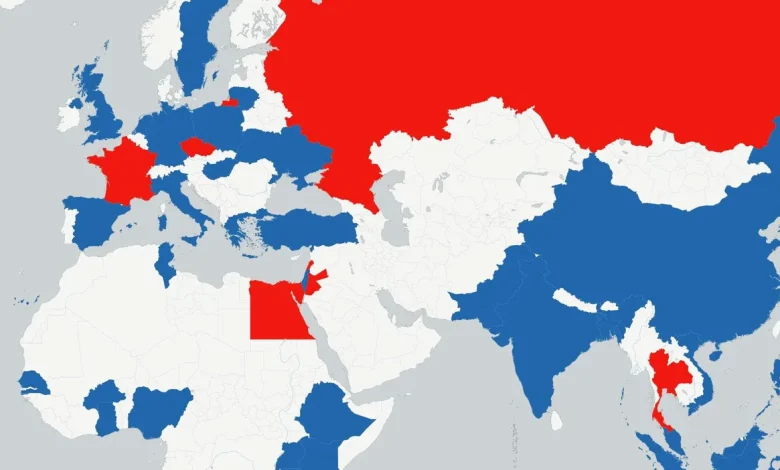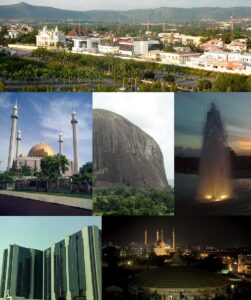Top 10 most powerful countries in the world this 2024

In an ever-evolving geopolitical landscape, the concept of power extends far beyond mere military might or economic prowess. It encompasses a multifaceted tapestry of influence, alliances, and global impact. As we delve into 2024, a new hierarchy of powerful nations emerges, shaping the course of international affairs and setting the tone for global dynamics. Here, we will be talking about the Top 10 most powerful countries in the world in 2024
Methodology: Decoding the Intricacies of Power
To accurately gauge a nation’s power, a comprehensive approach is imperative. Renowned institutions like US News, in collaboration with esteemed entities like BAV Group and the Wharton School of the University of Pennsylvania, have devised a meticulous ranking system. This methodology evaluates countries across five pivotal attributes: military alliances, international alliances, political influence, economic influence, and leadership.
Through extensive surveys involving over 20,000 individuals across the globe, each nation’s perception and association with these attributes are meticulously analyzed. The resulting scores are then aggregated, providing an intricate tapestry that unveils the true powerhouses of the world.
The Titans of Global Influence
1. United States of America
Ascending to the pinnacle of power, the United States of America stands as an undisputed global titan. With a staggering GDP of $28.78 trillion and a population of 339.9 million, the nation’s economic might is unparalleled. However, its true strength lies in its multifaceted influence, spanning realms such as technology, finance, entertainment, and military prowess.
The Biden administration’s unwavering focus on infrastructure development, climate change initiatives, and the nation’s thriving tech sector solidify its position as a global powerhouse. The United States’ ability to shape international discourse and policies is unmatched, making it the undisputed leader in the global arena.
2. People’s Republic of China
Closely trailing the United States is the formidable presence of the People’s Republic of China. With a GDP of $18.53 trillion and a staggering population of 1.42 billion, China’s economic and demographic clout cannot be understated.
China’s ambitious Belt and Road Initiative, a vast network of land and maritime trade routes spanning Asia, Africa, and Europe, exemplifies its global ambitions. Furthermore, the nation’s remarkable strides in artificial intelligence, 5G technology, and other cutting-edge fields position it as a formidable technological force.
3. Russian Federation
The Russian Federation, with its vast natural resources and formidable military capabilities, wields significant geopolitical influence. Despite economic challenges, Russia’s strategic positioning and assertive foreign policy ensure its status as a global power.
Russia’s space program, including ambitious missions to explore the moon and other celestial bodies, contributes to its scientific prowess. Additionally, its pivotal role in global energy markets and its ability to leverage natural resources underscore its enduring influence.
4. Federal Republic of Germany
Emerging as a beacon of environmental consciousness and technological innovation, the Federal Republic of Germany solidifies its position as a global powerhouse. The nation’s unwavering commitment to transitioning towards renewable energy sources and reducing carbon emissions sets an exemplary precedent for sustainable development.
Germany’s digital transformation initiatives across sectors like manufacturing and healthcare further bolster its economic prowess. As a cornerstone of the European Union, Germany’s influence extends far beyond its borders, shaping policies and fostering regional stability.
5. United Kingdom of Great Britain and Northern Ireland
The United Kingdom, a nation steeped in history and global influence, continues to exert its power on the world stage. In the post-Brexit era, the UK’s focus on forging new trade deals and economic partnerships underscores its resilience and adaptability.
London’s thriving tech startup ecosystem and the nation’s cultural impact through its music, literature, and arts solidify its soft power. The UK’s enduring diplomatic clout and ability to navigate complex geopolitical landscapes further cement its status as a formidable global player.
6. Republic of Korea
The Republic of Korea, a technological powerhouse, has carved out a distinct niche in the global arena. Home to industry giants like Samsung and LG, South Korea’s innovative spirit and commitment to sustainability position it as a leader in the tech sector.
Beyond its economic prowess, South Korea’s cultural exports, ranging from K-pop to Korean dramas, have captivated audiences worldwide, amplifying its soft power. The nation’s strategic alliances and commitment to regional stability further contribute to its global standing.
7. French Republic
The French Republic, a bastion of cultural sophistication and diplomatic finesse, continues to wield significant influence on the world stage. With a focus on digital transformation and green energy initiatives, France exemplifies its commitment to modernity and sustainability.
France’s pivotal role within the European Union, coupled with its enduring cultural legacy, solidifies its position as a global trendsetter. From fashion and cuisine to art and literature, France’s soft power resonates across continents, shaping global perceptions and setting cultural standards.
8. Japan
Japan, a nation revered for its technological prowess and economic resilience, has secured its place among the global elite. Boasting the fourth-largest economy in the world, with a GDP of $4.11 trillion, Japan’s manufacturing prowess, particularly in the automotive and electronics sectors, is unparalleled.
However, Japan’s influence extends beyond mere economic metrics. The nation’s unwavering commitment to innovation, exemplified by its focus on chip manufacturing, artificial intelligence, and electric vehicles, positions it as a frontrunner in the next wave of technological advancements.
9. Kingdom of Saudi Arabia
The Kingdom of Saudi Arabia, a regional powerhouse and a pivotal player in the global energy landscape, commands respect and influence on the international stage. With an estimated 17% of the world’s proven crude oil reserves, Saudi Arabia’s control over petroleum production remains a significant source of wealth and power.
Beyond its energy dominance, Saudi Arabia’s strategic alliances, particularly with the United States, grant it significant sway over regional affairs. The nation’s ambitious initiatives, such as the futuristic city of NEOM and its successful bid to host the 2034 FIFA World Cup, showcase its determination to diversify its economy and project its global influence.
10. United Arab Emirates
Rounding out the top ten is the United Arab Emirates, a nation that has experienced a meteoric rise in global prominence. With a GDP per capita of $87,729, the UAE’s economic prowess is undeniable, fueled by its strategic location and visionary leadership.
The UAE’s ambitious space program, including plans to send a mission to the moon, exemplifies its commitment to scientific exploration and technological advancement. Furthermore, the nation’s pivotal role in the global oil industry and its ability to leverage its strategic location solidify its position as a regional and global powerhouse.
The Pursuit of Power: Unwavering Ambition and Global Impact
As we navigate the intricate tapestry of global affairs, it becomes evident that power is a multidimensional concept, encompassing economic might, military prowess, diplomatic finesse, and cultural influence. The nations that have secured their positions among the top ten most powerful countries in the world have demonstrated an unwavering ambition and a commitment to shaping the course of international discourse.
From the United States’ unparalleled economic and military dominance to China’s ambitious global initiatives, and from Russia’s assertive geopolitical manoeuvring to Germany’s environmental leadership, each nation has carved out its unique path to power. The pursuit of global influence is an ever-evolving journey, and these nations stand at the forefront, shaping the world’s narrative and setting the stage for the challenges and opportunities that lie ahead.
FAQs
1. How does a country’s population impact its power ranking?
A nation’s population can significantly influence its power ranking. A larger population often translates into a substantial workforce, driving economic growth and productivity. However, mere numbers are not the sole determinant; the quality of human capital, education levels, and skill sets within the population also play a crucial role in shaping a country’s global influence.
2. Can a country’s cultural exports contribute to its soft power?
Absolutely. Cultural exports, such as music, movies, literature, and art, can significantly enhance a nation’s soft power. When a country’s cultural products resonate globally, they shape perceptions, foster understanding, and cultivate a positive image, ultimately contributing to its overall influence on the world stage.
3. How does a nation’s commitment to sustainability and environmental initiatives impact its global standing?
In an era where environmental concerns have taken center stage, a nation’s commitment to sustainability and environmental initiatives can significantly bolster its global standing. By actively addressing climate change, promoting renewable energy sources, and implementing eco-friendly policies, countries can position themselves as leaders in the fight against global environmental challenges, garnering respect and influence among the international community.
4. Can a country’s diplomatic prowess and ability to forge strategic alliances enhance its power ranking?
Diplomatic prowess and the ability to forge strategic alliances are crucial components of a nation’s power ranking. Countries that excel in navigating complex geopolitical landscapes, building strong international partnerships, and wielding influence within global organizations and forums often gain a significant advantage in shaping global policies and asserting their influence on the world stage.
5. How does a nation’s leadership impact its global standing?
Effective leadership plays a pivotal role in shaping a nation’s global standing. Leaders who command respect, exhibit strategic vision, and possess the ability to navigate complex challenges can significantly enhance their country’s influence. Decisive leadership that prioritizes economic growth, fosters international cooperation, and upholds national interests can elevate a nation’s status and solidify its position as a global powerhouse.





